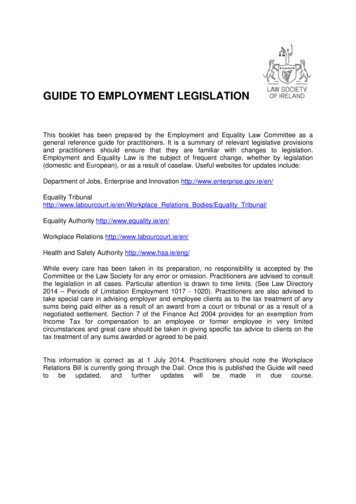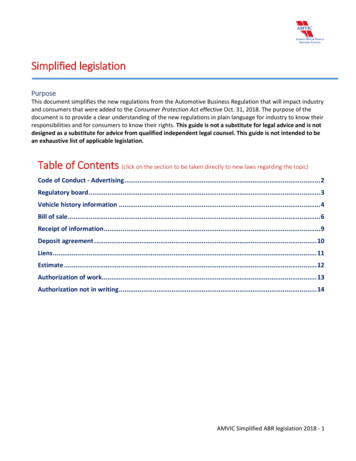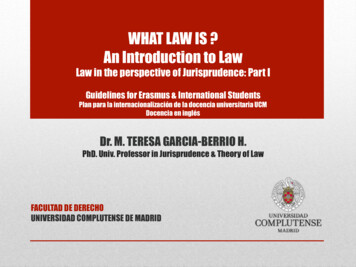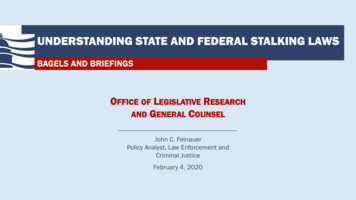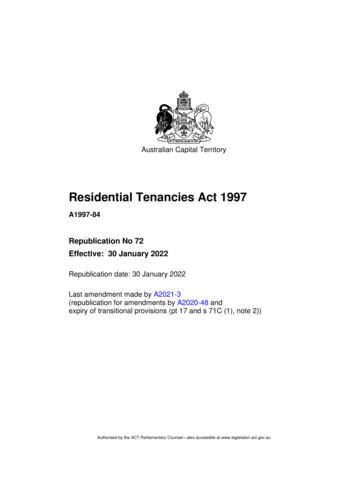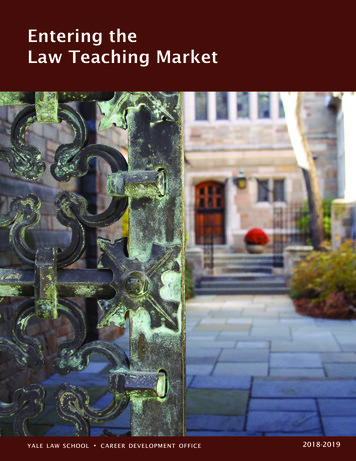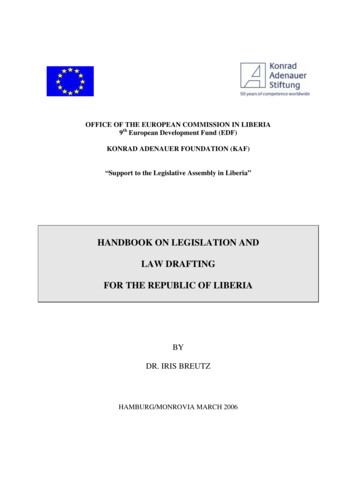
Transcription
OFFICE OF THE EUROPEAN COMMISSION IN LIBERIA9th European Development Fund (EDF)KONRAD ADENAUER FOUNDATION (KAF)“Support to the Legislative Assembly in Liberia”HANDBOOK ON LEGISLATION ANDLAW DRAFTINGFOR THE REPUBLIC OF LIBERIABYDR. IRIS BREUTZHAMBURG/MONROVIA MARCH 2006
Table of ContentsINTRODUCTION.1PART 1 – GENERAL BACKGROUND OF LEGISLATIONChapter 1 General Background – Laws, Values and Policy1. What is Law?342. What are Values?42.1. Social Values2.2. Moral Values52.3. Economic Values52.4. Political Values53. What is Public Policy?54. Hierarchy of Laws and Regulations74.1. The Constitution94.2. International Treaties94.3. Laws10104.4. (Administrative) Rules and Regulations4.5. Circulars, Warrants and other Ordinances115. Sources of Law in Liberia125.1. The Constitution and Amendments125.2. Legislative Enactments (Laws, Rules and Regulations)12125.3. Treaties and Conventions5.4. Customary Laws135.5. Court Precedents135.6. Compilation of Liberian Sources of Law 14Chapter 2 – Function of Legislation1. General Principles of Democratic Legislation2. Exercise of People’s Power2.1. Separation of Powers and Checks and Balances2.2. The three State Powers of the Republic of Liberia15171718PART 2 – THE LEGISLATIVE PROCESSChapter 1 – Description and Distribution of rule-making Power and normativeCompetences under the Constitution of Liberia1. The Legislature of Liberia23
1.1. Competences under the Constitution1.2. Amending the Constitution2. Delegated Legislation3. Parties involved in the Legislative Process23262730Chapter 2 – The Legislative Process341. Introduction of a Bill and Reference372. First Reading3. Committee Stage39403.1. Committee Meetings3.2. Public Hearings42443.3. Vote and Reports473.4. Filing of Reports3.5. Availability of Reports and Hearings47483.6. Sub-committees3.7. Committee on Ways, Means and Finance 484. Caucus495. Amendments496. Getting to the Floor506.1. Getting a Bill out of Committee506.2. 9Securing Floor Consideration for reported Bills in the House517. Floor Debate/Second Reading517.1. Floor Amendments527.2. Engrossing538. Third Reading539. Second House Consideration545610. Final Passage and Transmission to President11. President’s Approval5612. Publication and Announcement5712.1. Publication of Laws 5712.2. Recommendations for regulating the Publication of Legislation 5813. Public Relations of the Legislature 59PART 3 – POLICY BACKGROUND OF NEW LEGISLATION1. General2. Identify the Issue and the Objectives, Formulate the Legislative Goal3. Identify legal Problems3.1 Preliminary Notes3.2 Examine and compare existing Law3.2.1. Existing law3.2.2. Potential Danger Areas4. Give a Prognosis: The possible Effects of the new Law4.1. Assess possible Alternatives4.1.1 Is Action at all necessary?4.1.2 Is a Law needed?6163656565656667686869
4.2. Are Sunset-, Review- or Sunrise-Clauses practicable?4.3. Cost-Benefit-Analysis (What will a new Law cost?)5. Consultation5.1. Consultation Procedure5.2. Consulted PartiesAnnex 1 to Part 3 Checklist for Regulatory Decision-Making707273747578PART 4 – HOW TO DRAFT LAWSChapter 1 – Recommendations for Law Drafting Organization 82Chapter 2 – General Principles1. Research before Drafting852. Make a Concept873. Check the Draft 883.1. Use Checklists 883.2. Specific Verification of Draft Laws 88Chapter 3 – The Structure of Laws1. Structure of the Text2. Chapters3. Sections899091Chapter 4 – A Bill and it Parts1. The Structure of a Bill921.1. Reference Title95951.2. Introducing Body and Legislative Session Designation1.3. Bill Number and Sponsor951.4. Bill Title951.4.1 Order of a Title951.4.2. Title Format961.5 Enacting Clause981.6 Bill Section Numbering and Section Headings981.7 The Body of a Bill981.7.1 Short Title991.7.2 Amending existing law991.7.3 Definitions 1011.7.4 Main Provisions1011.8. Germaneness101
Chapter 5 – Common Drafting Recommendations1021. Amendments1032. Appropriations1032.1. Requirements2.2. Categories1041053. Creation of an Agency, Office or Commission1064. Effective Date5. Notwithstanding Clauses1071076. Penalties; civil and criminal6.1 Fines versus penalties1071086.2 Criminal Offenses; Penalties7. Repeal of other Laws 1088. Saving Clauses 1099. Sunset Provisions 10910. Transitional Provisions 109Chapter 6 – General Instructions as to Form and StyleGeneral Drafting Rules2. Amending Law3. Format and Style Recommendations in Alphabetical OrderAnnex 1 Bill Format (Sample)Annex 2 Bill Enacting New Material (Sample)Annex 3 Bill Amending Existing Law (Sample)Annex 4 New Material in Amendatory Act (Sample)Annex 5 Bill Repealing Law (Sample)Annex 6 Combination of Sections (Sample)Annex 7 Checklist for Drafters1.111114116127129130131132133135PART 5 – HOW TO GIVE DRAFTING INSTRUCTIONS1. Giving Instructions for Drafting2. Contents of the Instructions3. Format of Drafting Instructions139139140PART 6 – EVALUATION OF BILLS AND LAWS1. General2. Evaluation Criteria3. How to Evaluate Laws3.1. Prospective Evaluation (before the Law is adopted and enacted)3.2. Retrospective Evaluation (after the Law has been adopted and enacted)4. Institutionalisation of Evaluation143144144144146147
IntroductionAfter a long period of war Liberia hold democratic elections in October 2005; with no doubta milestone on the way to a democratic and peaceful Liberia. The Liberians are longing for peaceand put their hopes in the new Government. But peace is still fragile and President andLegislature are facing significant challenges: the stabilisation and rebuilding of the country,reconciliation, extensive economic and judicial reforms, fight against corruption to name onlysome of them. At the same time these challenges mean a unique chance and positive results mayalso serve as a model for other African states.The Legislature, consisting of the House of Representatives and the Senate, will play animportant role in post-war Liberia. In the past it has not been able to perform effectively itsduties, such as representing the people, controlling the executive branch or making laws of goodquality that achieve state purposes and at the same time are accepted and understood by thepeople. The development of a democratic state is impossible without a Legislature performingthese vital functions on a reliable basis.A democratic state is a state under the “rule of law”. Rule of law is a regulator of governmentpower and means equality before law and procedural and formal justice. Rule of law requires thesupremacy of law as opposed to the supremacy of the government or any political party. It isevident that laws of good quality are needed to achieve this purpose.The Handbook on Legislation and Law Drafting is addressed to anybody who is involved inthe legislative process in Liberia. It is meant to give an idea about the general background oflegislation, the legislative process in Liberia and the competences of the Liberian Legislatureunder the Constitution. It is also meant to serve as a manual of form and style to be used in thepreparation of bills and other legislative proposals. The development of legislative proposals,respectively their policy background, is described to show the necessary stages of legislativedecision making up to the preparation of the legislative text. The checklists contained in thisHandbook are a practical tool for legislators and drafters. The Handbook is based on internationalstandards, internationally recommended practises and generally accepted drafting principles andconventions. However, the samples and recommendations used in this manual, especially in Parts3 to 6 should not be copied without careful consideration of their appropriateness for a particularlegislative proposal and for the particular situation in Liberia. International principles can serveas a guideline and have been used in other countries with good results, but the ways to structurethe legislative process and the laws are manifold and it is not possible to identify a single modelgiven the great differences in national structures, legal systems, institutions and constitutionalarrangements. In the end, Liberia has to develop its own legislative practise under considerationof internationally recognised standards for democratic states.
.By the time this Handbook was finished, the Legislature of Liberia found itself in the process oforganizing and its infrastructure and equipment was poor. There were serious capacitydeficiencies and very few members including the staff had any previous legislative experience. Inthe future, further efforts have to be made to strengthen the Legislature. With the assistance of theinternational community, a development plan may be set up including further training oflegislators and their staff, establishment of a Drafting Service, preparation of common draftingrules as guidelines for the drafters, building up the infrastructure and other activities. For thatreason, this Handbook should be updated on a regular basis to serve consistently as a practicaltool for legislators and drafters in Liberia.I would like to thank Dr. Heinz Jockers from EC/KAF and his team for their hospitality and theirimmense support in preparing this Handbook. I am also grateful to the members of theLegislature of Liberia for their kind co-operation.Dr. Iris BreutzHamburg/Monrovia April 2006This document has been produced with the financial assistance of the European Union. Thecontents of this document are the sole responsibility of the Konrad Adenauer Foundation and canunder no circumstances be regarded as reflecting the position of the European Union.1
PART 1GENERAL BACKGROUND OF LEGISLATION2
Part 1Chapter 1General Background – Laws, Values and Policy1. What is Law?Law is a set of rules made and enforced by a State that regulates the conduct of the people withinsociety and maintains social order. Law comes from the general will of the people and thus mustbe formulated and created in accordance with the will of the people.In general, law reflects and promotes the moral, economic, social and political values of asociety. That is why laws can differ between countries. As different societies might have differentmoral, social, political and economic values, the law can differ from country to country. Forinstance, laws in Islamic countries are different from those countries that are influenced mainlyby Christianity. Laws in a country where most of the citizens are in the same ethnic group may bedifferent in a country with different ethnic groups. But in any case, the values of society change,and as values change, so do the laws.The law is not so much concerned with descriptions of habits, general occurrences or acceptedbehavioural standards, but rather with prescriptions of conduct or consequences. Prescription ofconduct means certain defined conduct will not be permitted without a consequence ofpunishment or penalty (imposed by the State). For example: A person who kills another personcommits murder. Such a person can be punished for the crime of murder or manslaughter. This isthe punishment factor, imposed and carried out by the State that distinguishes legal rules (laws)from non-legal rules such as religious rules or house rules (which are not laws).Traditional laws were usually passed on from one person to another, from generation togeneration and were not written. In the 20th century, in fully developed democracy, law hasbecome any generally abstract written norm. Since then, in democratic states using theseparation-of-powers principle, laws are usually made and created by a parliament as therepresentative of the citizens according to a special procedure usually set down in the state’sConstitution.Laws are instruments for guiding social behaviour. They can stabilize social order (status quo),balance, temper and channel competing interests, may induce social changes (reform) andaltogether integrate society by setting minimal standards and values. To reach these goals, normsmust be realized in the political, social, economic and cultural context. Laws must have an impactto the outside world.Thus, a law must be enforced and implemented. This means it must be made by those within theState who have the competence and the authority to make laws. It must be made in accordancewith the proper legislative procedure and must be enforceable by the State (e.g. the courts).3
Implementation means to apply norms to social situation (cases), to motivate people to obey thelaw either by voluntary compliance or by enforcing the law.One may distinguish two basic functions of steering behaviour by laws: formation andapplication of laws. The separation-of-powers principle also reflects these functions: legislationon the one hand and executive power on the other as well as authoritative (courts) decisions incases of controversial opinions about law and how the law has to be applied. The law generalizesand abstracts social reality and is a general abstract order. It is enacted without regard of aparticular person or party, but compulsory for everybody and may affect everybody.Implementing the law means to regulate the individual case with its peculiarities. Applicationtakes place without regard to individuals. The law in general, brings about distance,implementation lifts it. By distinguishing general law and individual application one can easilydescribe the third constitutional basic function: jurisdiction as an act of control, whether anindividual regulation is in conformity with the law. Thus, jurisdiction is the (second) applicationof a law.There are many different types of laws that govern a society, and many different levels oflawmaking. As we shall see in a later section, some of the different types include theConstitution, laws made by the national Legislature and rules and regulations by executiveagencies. Laws are ranked according to their level of authority. The country's constitution is thehighest ranking law and all other laws are subject to it and have to comply with it. When we usethe term "law" in a general sense, we refer to the entire body of law recognized by the society,including the various types of laws.2. What are Values?As mentioned above, laws are generally based on the values in a society and as values aredifferent from country to country, laws also vary between countries. Values are principles, ideasand norms that are generally accepted by a particular group as important concepts of right andwrong. There are different kinds of values regarding different aspects of life:2.1. Social ValuesSocial values include the important concepts about the relationship between the members ofsociety on a wide range of topics including, for example:Marriage: Monogamy (having only one spouse at a time) may be a social value in society.Bigamy (having more than one spouse at the same time) might be an accepted value in a differentsociety.Inheritance: Usually a person has its possession, goods etc. at its disposal upon death and canstate in its last will what will happen with the possession. However, there might be a generallyaccepted value that a person is responsible for his or her family and dependants. According to thisvalue, a person should in his last will provide his or her family appropriately and sufficiently.Minorities: Although it is generally accepted that the will of the majority of people should befollowed, it is also accepted that the interests of minority groups must be protected.4
Care for others: Responsibility for other people who could be affected by the way you are actingis common sense and a social value in itself. Thus we are expected to exercise a reasonablestandard of care towards other people each day in different situations.2.2. Moral ValuesMoral values deal with fundamental questions of right and wrong. Morals are principles ofconduct which are accepted in a society, or by a particular group of the society. Moral values areabout what is good and bad, right and wrong, what to do and what not to do. For example, thereis a moral value in most societies against killing other people. The protection of life is consideredas a major principle of proper conduct towards others. Another example for a moral value is thatone is not allowed to take away the possession and things that belong to other people withouttheir permission. Or considering personal freedom as a major principle and moral value leads tothe disapproval of slavery.2.3. Economic ValuesEconomic values are about the accumulation, preservation, use and distribution of wealth andpossession. For example, the right to own property, the protection of property, the right to sellproducts or crops to anybody and the freedom to run a business.2.4. Political ValuesPolitical values are about the relationship between individuals and the State, especially thegovernment. The freedom of speech, for example, is a political value. Such is democracy orsocialism or the concept of the separation of powers.Many of our social, moral, economic and political values are reflected in traditions, habits,customs and behaviour that have grown and developed through time and use. But these values donot necessarily have to be reflected in legal rules, whereas sometimes they are. Different kinds ofvalues are reflected in many kinds of laws. Example: Art. 5 of the Liberian Constitution statesthat the Republic shall “preserve, protect and promote positive Liberian culture, ensuring thattraditional values which are compatible with public policy and national progress are adoptedand developed as an integral part of the growing needs of the Liberian society”.3. What is Public Policy?A policy is a plan of action for tackling issues and to achieve a specific goal. It is often initiatedby the government, but may also be initiated by other parties whereas the government usuallymakes the final political decision.In deciding on a plan of action there are usually several alternative options to choose from.Decision-makers decide which plan of action is the most suitable to achieve the goal under givencircumstances. They make a policy decision.People in all walks of life make policy decisions every day. They create their own privatepolicies. In contrast to a private policy, a public policy is a plan of action of the government to5
achieve a specific goal. When government policymakers decide on a policy for the country, itbecomes a public policy and everybody in the country must follow it in case it becomes law.As with laws, there are many different kinds of public policymakers. If they are members of theSenate or the House of Representatives, the public policies they adopt become laws. If thepolicymakers are ministers of the executive branch, their public policies become rules orregulations. In other words, laws, rules and regulations are the same thing, they are products ofthe public policymaking process. The difference between laws and policy is that when we talkabout laws we focus on a technical process - law is drafted, considered by the legislature andadopted. Public policy, however, focuses on the reasons behind the law. What goals are we tryingto achieve through a law? Why? What is the best way to achieve the goals? What are thealternatives to a law? What do we need to know before we decide? How do we get thisinformation? How will this policy effect other policies?Legislators are policymakers whereas legislative drafters mainly focus on the technical aspects ofwriting laws. However, legislative drafters cannot perform their function successfully unless theyunderstand the policies behind the laws they are drafting. Furthermore, they must understand thesteps that generally are followed in the policymaking process.The basic steps of government policy making can be compared to the rungs of a ladder. Each stepis taken to lead to a policy decision. The following illustration shows each step in the policyladder.Policy is changedPolicy is evaluatedPolicy is carried outPolicymakers actPeople talk to governmentPeople have concerns6
4. Hierarchy of Laws and RegulationsIn most countries, written laws are the principle instruments to maintain social order and toregulate human behavior. The written law in each country has to be seen as a coherent whole.The written law of a nation is also called “statutory law”. Statutory law is defined as the writtenlaw (as opposed to oral or customary law) set down by a legislature or other governing authoritysuch as the executive branch of government in response to a perceived need to clarify thefunctioning of government, improve civil order, answer a public need, to codify existing law, orfor an individual or company to obtain special treatment. A statute is a formal, written law of acountry or state, written and enacted by its legislative authority and – according to theConstitution - then be ratified by the highest executive in the government, and finally published.Typically, statutes command, prohibit or declare something. Statutes are also referred to aslegislation.In many countries, published statutes are organized in topical arrangements called codes, such asthe Civil Code or the Criminal Code.In addition to the statutes passed by the national legislature, lower authorities or municipalitiesmay also promulgate administrative regulations or municipal ordinances that have the force oflaw — the process of creating these administrative decrees are generally classified as rulemaking.While these enactments are subordinate to the law of the whole state or nation, they arenonetheless a part of the body of a jurisdiction's statutory law.Thus, legal rules have all the force of law, but are not necessarily on the same level regardingtheir significance within the system of written law. A general overlook and synopsis of the lawsystem in most democratic countries shows that there is a hierarchy of laws and regulations.We can say that laws and regulations with the force of law have different ranks. One is higher orlower-ranked than the other according to a certain order and thus altogether form a pyramidreflecting the order. In principle, the lower-ranked legal acts must conform and be compatiblewith the higher-ranked and must not violate or contradict them. All laws and regulations that donot comply with this principle must be considered as inadmissible and invalid.The hierarchy of judicial acts as shown below:7
ConstitutionInternational treaties,Conventions, Pacts. Accords(may also have the same rankas ordinary national law)Laws (statutes) passed by the Legislature(Administrative) rules and regulations, e.g. decrees, executive ordersWarrants, circulars and other ordinances8
4.1. The ConstitutionThe Constitution is the supreme law of the Republic of Liberia. All laws and decisions by thestate institutions must be in strict conformity with the Constitution as stated in Art. 2:"This Constitution is the supreme and fundamental law of Liberia and its provisions shall havebinding force and effect on all authorities and persons throughout the Republic. Any laws,treaties, statutes, decrees, customs and regulations found to be inconsistent with it shall, to theextent of the inconsistency, be void and of no legal effect. The Supreme Court pursuant to itspower of judicial review, is empowered to declare any inconsistent laws unconstitutional."All other laws and regulations in Liberia have to comply with the Constitution. If a legal ruleconflicts with the provisions in the Constitution it shall have no legal effect. The Supreme Courthas the competence to declare legal rules unconstitutional.4.2 International TreatiesInternational treaties (also called Conventions, Pacts or Accords) are agreements reachedbetween a State and another State (bilateral), between several States (multilateral) or between aState and another subject of International Law (for example an International Organization such asthe United Nations). Each state decides individually what rank international treaties shall have inthe system of law. In some countries there are of the same rank as the Constitution, whereas inother countries, they are inferior to the Constitution but superior to the national law. In Liberia,according to Art. 2 of the Constitution, treaties are below the Constitution in the hierarchy oflaws. Any treaties found to be inconsistent with the Constitution shall, to the extent of theinconsistency be void and of no legal effect. But in order to become part of the national legalorder, international treaties have to be approved and adopted by the Legislature. The Presidentsigns them on behalf of the State but the Legislature, the Senate and the House ofRepresentatives, has to approve them according to Art. 34 of the Constitution:“The Legislature shall have the power.to approve treaties, conventions and such otherinternational agreements negotiated or signed on behalf of the Republic”.However, relevant aspects of some International Treaties, Conventions and/or Pacts mainlyrelated to human rights are already included in the Constitution and thus belong to the highestrank within the hierarchy of laws and regulations. For example, Liberia is a state party of theInternational Covenant of Civil and Political Rights. Most of the rights granted to individuals inthat treaty are mentioned in Chapter III of the Constitution and therefore belong to the supremeand fundamental law of Liberia.The law system of a country has to be seen as a coherent whole. It has to be avoided that lawsconflict with each other, as this causes legal uncertainty. An example: In September 2005 Liberiabecame a state party to the Second Optional Protocol of the International Covenant of Civil andPolitical Rights aiming at the abolition of the death penalty. Liberia declared the abolition ofdeath penalty for all crimes. The treaty became law in the country with immediate effect. Laws9
passed by the Legislature that include the use of death penalty would contradict the obligationunder international law, which is at the same time part of the national law.4.3 LawsThe next rank is the law, defined as any legal provision made by a constitutional-law-giving bodywith due regard to the Constitution and enforced by the State. Each law is part of the nationallegal order and as such must be made by the Legislature according to the legislative procedure.When a law has passed the Legislature is might also be called “act” or “code”.Included are also so-called “organic laws”. Organic laws are the fundamental laws of a State or anation that formally define and establish the organization and functioning of its government,especially the governmental bodies and institutions. The Liberian Constitution says in generalterms that the Legislature has the power to make laws regarding the functioning of thegovernment of the Republic:Art. 34 h The Legislature shall have the power to make other laws which shall be necessaryand proper for carrying out the foregoing powers, and all other powers vested by thisConstitution in the Government of the Republic, or in any department or officer thereof.”Legal rules on the organization and functioning of, for example, the executive branch, theadministration or ministries are organic laws that have to be adopted by the Legislature. Thesame goes for the organization of the administration of the counties.In addition, there are so-called “by-laws”. By-laws are a set of rules and principles governinginternal affairs of an organization in its operation. .4.4 (Administrative) Rules and RegulationsOne rank below ordinary laws are administrative rules and regulations that also may have legallybinding effect for the citizen. Rule and regulations are not made by the Legislature but in mostcases by the executive branch, provided that the Legislature has by law transferred the power tomake such rules and regulations to the executive. This kind of rulemaking is also “delegatedlegislation” which will be discussed in more detail later on. Even the Judiciary has thecompetence to make rules, whereas these rules do not affect the citizens but the persons that workfor or before the court. This competence is transferred to the Judiciary by the Constitution:Art. 75 The Supreme Court shall from time to time make rules of court for the purpose ofregulating the practise, procedures and manner by which cases shall be commenced and heardbefore it and all other subordinate courts. It shall prescribe such code of conduct for lawyersappearing before it and all other subordinate courts as may be necessary to facilitate the properdischarge of the court’s functions. Such rules and code, however, shall not contravene to anystatutory provisions or any provision of this Constitution.”10
Art. 75 confirms that rules and regulations rank below the Constitution and the laws passed bythe Legislature. Rules and regulations must comply with the laws and the Constitution to be void.If they are inconsistent with laws or the Constitution they shall - according to the hierarchy oflaws - have no legal effect (see also Art. 2 of the Constitution).The are various terms for rules and regulations depending on the specific habits in the country. Arule or regulation may be called- “Decree”. A decree is generally defined as an order by a head of state or government that hasthe force of law.The word decree is often used as a derogative term for any authoritarian decisio
Penalties; civil and criminal 107 6.1 Fines versus penalties 107 6.2 Criminal Offenses; Penalties 108 7. Repeal of other Laws_108 8. Saving Clauses_109 . The Handbook on Legislation and Law Drafting is addressed to anybody who is involved in the legislative process in Liberia. It is meant to give an idea about the general background of

